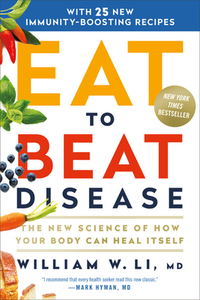You need to sign in or sign up before continuing.
Take a photo of a barcode or cover
informative
medium-paced
informative
inspiring
medium-paced
There's a lot of common sense in here, as well as medical content. I'd read much of it in other books, but the reason I give this book a five and the reason why I'll be reading this book over and over again until it becomes second nature is the advice in chapters 11-15.
The 5x5x5 framework seems really easy to follow. One of the issues I have with a lot of books on healthy eating is that I can't follow the regimes suggested. I'd have to be a 6' man with a huge stomach, a superfast metabolism, be able to eat all day long, and have the wealth and time to do it right. But this 5x5x5 is very flexible and scalable. I also really appreciated Li providing actual recommended doses for each of specified condition/disease. And I liked the quiz to score my own future health potential. I'll be working hard to raise that score each year.
Recommend reading the whole book. It makes it easier to follow the guidance if I understand why.
The 5x5x5 framework seems really easy to follow. One of the issues I have with a lot of books on healthy eating is that I can't follow the regimes suggested. I'd have to be a 6' man with a huge stomach, a superfast metabolism, be able to eat all day long, and have the wealth and time to do it right. But this 5x5x5 is very flexible and scalable. I also really appreciated Li providing actual recommended doses for each of specified condition/disease. And I liked the quiz to score my own future health potential. I'll be working hard to raise that score each year.
Recommend reading the whole book. It makes it easier to follow the guidance if I understand why.
medium-paced
*Blinkist*
Anything that touts the health benefits of eating certain foods makes me wary that what I am about to read is pseudoscience, or at best, an overly-optimistic interpretation of a singe study. Caveat emptor.
That said, none of the foods mentioned in this blink raised my suspicions, even if the research itself may be far from conclusive (and I listened on Blinkist, so naturally I did not take the time to look up and review each study and the body of scientific literature). Soy, broccoli, cocoa, fermented foods, fruit, mushrooms, olive oil, nuts, berries, spicy foods, and moderate amounts of beer and cheese aren’t going to kill you though, so it has that going for it.
Anything that touts the health benefits of eating certain foods makes me wary that what I am about to read is pseudoscience, or at best, an overly-optimistic interpretation of a singe study. Caveat emptor.
That said, none of the foods mentioned in this blink raised my suspicions, even if the research itself may be far from conclusive (and I listened on Blinkist, so naturally I did not take the time to look up and review each study and the body of scientific literature). Soy, broccoli, cocoa, fermented foods, fruit, mushrooms, olive oil, nuts, berries, spicy foods, and moderate amounts of beer and cheese aren’t going to kill you though, so it has that going for it.
informative
medium-paced
Some interesting info but some sus info (advocates moderate drinking). Pretty much says everything is good for you
Great explanations of the different foods you can eat to stay healthy!!! the science is understandable.
Excellent stuff. The studies and information presented here match a lot of other reading I've done on the subject of eating for health. I can also point to dietary changes I've made and the effects they've had that match ones discussed in this book. I always recommend making better food choices, but I also really do suggest giving this a try. The author does not impose eating restrictions. Rather, he discusses foods that help to promote strengthening the body's natural defense mechanisms and then offers suggestions for working each group of foods into a daily diet. Aside from the usual suspects (processed foods, sugar, etc.), there is no mention of just cutting out entire foodgroups. There are also foods linked to the prevention and even recovery for various diseases, including different types of cancer, heart disease, stroke, and autoimmune diseases. The big message: try it. If it helps disease recovery, great! If not, eating better can't hurt.
